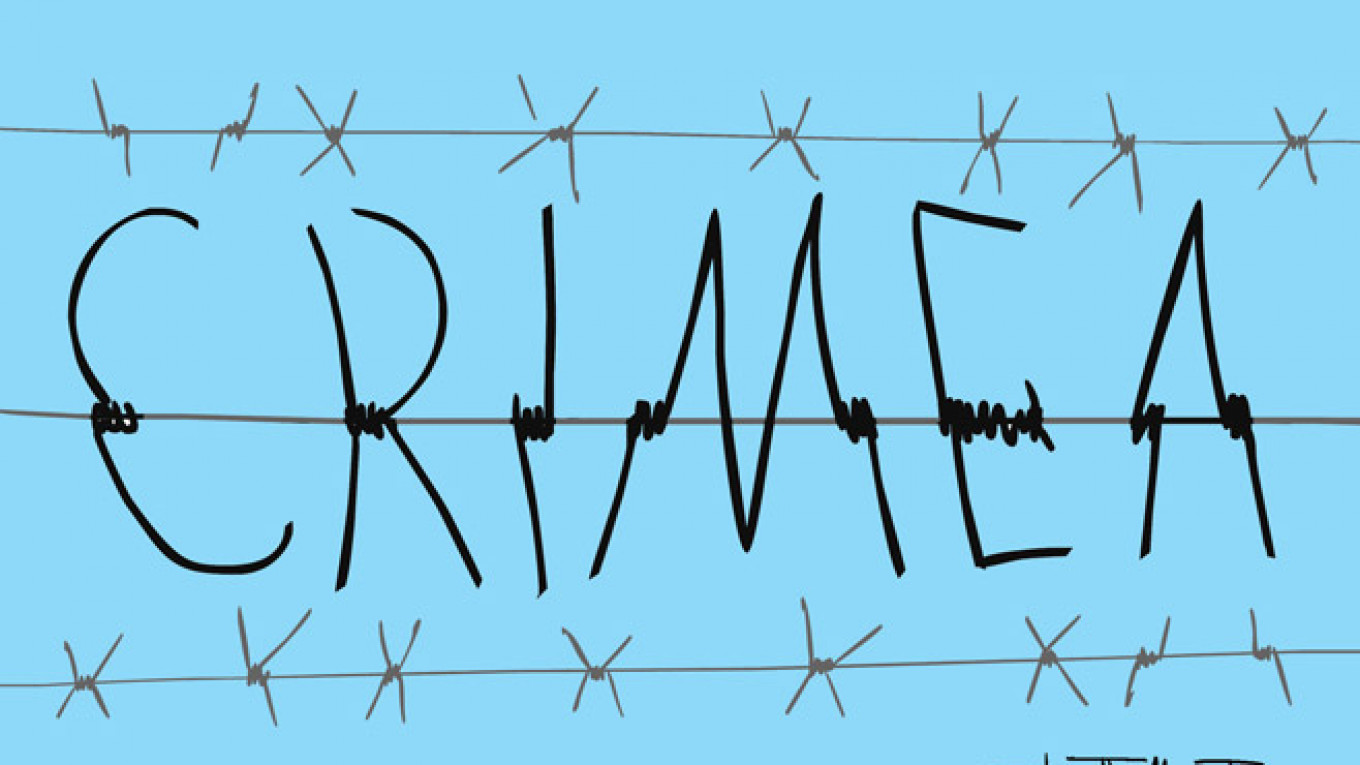We have a few questions for you," a border guard told Sinaver Kadyrov, a Crimean Tatar activist, at the Armyansk checkpoint in northern Crimea on Jan. 23. Kadyrov was on his way to Kherson, in southern Ukraine, to fly to Turkey for medical treatment. It was the beginning of an ordeal that ended with a local court expelling him from Crimea, his home of almost 25 years.
When border guards stopped him, along with two colleagues, Eskender Bariev and Ambedjit Suleymanov, it was no surprise, Bariev, also a well-known Crimean Tatar activist, told me. It was the 18th time since July that he had been stopped at the same checkpoint — for hours each time. The guard took their passports and told them to wait.
The border guard returned an hour later and, without explaining anything, took the men into a small room with nothing but a bunk bed in it, and locked the door from the outside. He returned 20 minutes later, ordered Bariev and Suleymanov back to their car, locked them inside and took the car key. He told Kadyrov to follow him.
Two hours later, the guard came back to inform the activists that Kadyrov had violated Russian law governing the rules of stay for foreign citizens on Russian territory and was being taken to Armyansk for a court hearing. The other two men were ultimately allowed to travel on.
Several hours later, after a 20-minute court hearing without a lawyer, a judge found that Kadyrov had overstayed Russia's 90-day limit for foreigners from certain countries who are allowed to enter Russia under visa-free agreements, and ordered him to be expelled from Crimea.
"This was a real Russian court," a shocked Kadyrov told me over the phone minutes after the hearing. "Even under Russia's own laws, it doesn't make any sense."
Indeed, it doesn't.
After Russia occupied Crimea last February, it quickly started the so-called "passportization" process of granting Russian citizenship to Crimean residents. The process was not as simple as allowing all those who wanted citizenship to apply. Russia required any permanent resident of Crimea with Ukrainian citizenship either to apply for Russian citizenship or declare an intent to maintain Ukrainian citizenship.
The deadline was April 18, after which all Ukrainian passport holders who resided in Crimea were deemed Russian citizens. Those who declared an intent to keep their Ukrainian passports were effectively made foreigners in their own home.
Kadyrov, like many other Crimean Tatars I spoke to, made a principled decision to take no action on his citizenship. So under Russia's own laws, he should have "automatically" become a Russian citizen. That was what happened to Oleg Sentsov, a Ukrainian filmmaker in custody in Russia on terrorism charges.
For a long time, Russia's investigating authorities insisted that Sentsov had become a Russian citizen "automatically." Sentsov and other Ukrainian activists in Russian custody maintained that they are Ukrainian citizens but were not able to declare their intent to maintain Ukrainian citizenship because they were in custody as the one-month deadline expired.
In other words, the same law has been applied differently to suit the interests of the Russian authorities.
They have particularly targeted Crimean Tatars, a Muslim ethnic minority in the Crimean peninsula who openly opposed the Russian annexation. The authorities have barred two Crimean Tatar leaders from entering Crimea. The authorities also accused Mejlis, the Crimean Tatar representative body, of "extremism," have harassed and persecuted its members and sealed its office in Simferopol.
The editor of the Mejlis newspaper Avdet also received "anti-extremism" warnings and the paper was threatened with closure. Last week, authorities raided the Simferopol office of Crimean Tatar ATR television channel, detained the channel's staff and confiscated some of the equipment — an incident that OSCE Representative on Freedom of the Media slammed as "clear intrusion of media independence."
In November, Bariev, Suleymanov, and Kadyrov founded the Committee for the Protection of Rights of Crimean Tatars to monitor mounting abuses and collect information about several enforced disappearances of Crimean Tatar activists. Paramilitary groups backed by Crimean authorities were implicated in some of these cases.
A hotline the committee set up got more than 300 calls in its first 10 days of operation, not only from Crimean Tatars but from a wide range of Crimean residents, from victims of arbitrary property seizures to people desperate for help on citizenship-related issues.
Indeed, Kadyrov's ordeal is just one example of the climate of lawlessness in today's Crimea. Since Russia annexed Crimea, the de facto authorities have allowed armed paramilitary groups to abduct, attack and harass activists and journalists with impunity. Almost a year later, these groups, with the authorities still backing them, are participating in numerous raids on Crimean enterprises.
Local authorities continue to tighten the screws, silencing critics and controlling information. Most independent or critical journalists and activists have left for mainland Ukraine and those who remain are constantly at risk of being attacked or worse, especially if they are perceived as pro-Ukraine.
Under international humanitarian law, Russia bears direct responsibility for the surge in rights abuses in Crimea.
International attention is understandably focused on the renewed fighting in eastern Ukraine and the terrible toll it is taking on civilians. But the plight of people in an increasingly lawless Crimea should not be forgotten.
Yulia Gorbunova is a Europe researcher at Human Rights Watch.
A Message from The Moscow Times:
Dear readers,
We are facing unprecedented challenges. Russia's Prosecutor General's Office has designated The Moscow Times as an "undesirable" organization, criminalizing our work and putting our staff at risk of prosecution. This follows our earlier unjust labeling as a "foreign agent."
These actions are direct attempts to silence independent journalism in Russia. The authorities claim our work "discredits the decisions of the Russian leadership." We see things differently: we strive to provide accurate, unbiased reporting on Russia.
We, the journalists of The Moscow Times, refuse to be silenced. But to continue our work, we need your help.
Your support, no matter how small, makes a world of difference. If you can, please support us monthly starting from just $2. It's quick to set up, and every contribution makes a significant impact.
By supporting The Moscow Times, you're defending open, independent journalism in the face of repression. Thank you for standing with us.
Remind me later.








